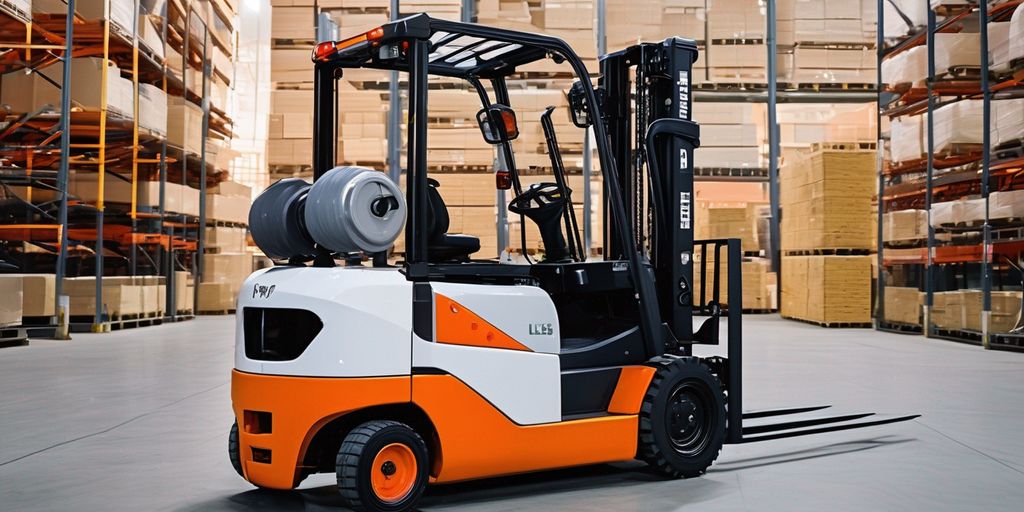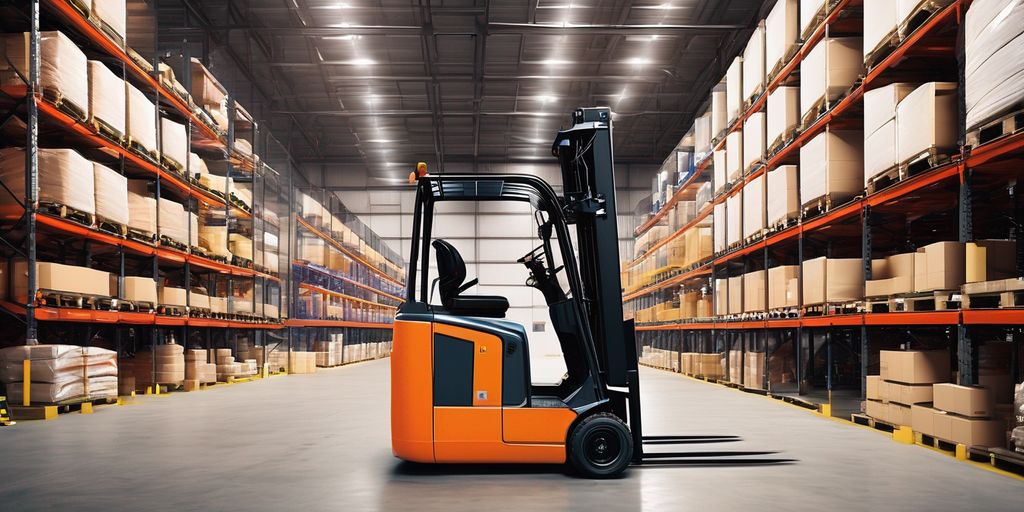Forklifts, often overlooked heroes of warehouses and factories, have seen incredible advancements over the years. These machines are now at the forefront of innovation, driving efficiency, safety, and sustainability in material handling. In this article, we explore how new technologies are transforming forklifts and the entire industry.
Key Takeaways
- Electric forklifts are becoming more popular due to better batteries and environmental benefits.
- Automation and autonomous forklifts are making warehouses more efficient and safer.
- Telematics and connectivity help monitor forklifts in real-time, making maintenance easier and improving fleet management.
- New safety features like collision-avoidance systems and proximity sensors protect both operators and goods.
- Modern forklifts are versatile with modular attachments, meeting diverse material handling needs.
Electrification and Sustainability
Advancements in Battery Technology
The shift towards electric forklifts is driven by advancements in battery technology. Modern batteries, like lithium-ion, offer longer run times and shorter charging cycles. This makes electric forklifts more efficient and reliable for daily operations.
Environmental Benefits of Electric Forklifts
Electric forklifts produce zero emissions, making them a greener choice compared to traditional diesel models. By adopting a fully-electric forklift fleet, companies can significantly reduce their carbon footprint and contribute to a more sustainable future.
Cost Efficiency and Maintenance
Electric forklifts are not only environmentally friendly but also cost-effective. They have lower operational costs due to reduced fuel expenses and fewer maintenance requirements. This makes them an attractive option for businesses looking to save money while promoting sustainability.
The forklift industry is shifting towards electric and hydrogen-powered models, emphasizing sustainability with zero emissions and lower operational costs.
Automation and Autonomous Forklifts
Intelligent Routing and Obstacle Detection
Autonomous forklifts are transforming the material handling industry with their ability to navigate warehouses independently. These machines use advanced sensors and AI to detect obstacles and plan efficient routes. This technology reduces human error and increases precision, making operations smoother and safer.
Fully Automated Storage and Retrieval Systems
Fully automated storage and retrieval systems (AS/RS) are becoming more common in modern warehouses. These systems work seamlessly with autonomous forklifts to store and retrieve items without human intervention. The integration of AS/RS with autonomous forklifts optimizes space utilization and speeds up order fulfillment.
Impact on Operational Efficiency
The use of autonomous forklifts significantly boosts operational efficiency. Tasks that once took hours can now be completed in minutes. This not only speeds up processes but also reduces labor costs. Additionally, the ability to operate 24/7 without breaks means that productivity is maximized.
The rise of autonomous forklifts is a key trend in the material handling industry, driving efficiency and safety to new heights.
Telematics and Connectivity

Real-Time Monitoring and Data Collection
The rise of the Internet of Things (IoT) has ushered in a new era of connectivity for forklifts. Telematics systems enable real-time monitoring of forklift performance, providing invaluable data for preventive maintenance and optimizing fleet management. This connectivity not only enhances operational efficiency but also contributes to a smarter, more responsive warehouse ecosystem.
Preventive Maintenance and Fleet Management
Enabled by wireless connectivity, forklift fleet management allows for continuous monitoring of location, maintenance needs, and usage. This proactive approach reduces downtime and enhances overall fleet management. By integrating IoT and Industry 4.0 technologies, telematics systems facilitate predictive maintenance, ultimately leading to cost savings and improved productivity.
Enhancing Warehouse Ecosystems
Telematics systems are transforming how forklifts are monitored and managed. Real-time data on performance, location, and maintenance needs provide invaluable insights. This connectivity enables proactive maintenance, reducing downtime and enhancing overall fleet management. As IoT becomes more ingrained in industrial settings, smart forklifts will play a crucial role in creating interconnected and data-driven warehouses.
Safety Innovations in Forklift Technology
Collision-Avoidance Systems
Modern forklifts are equipped with advanced collision-avoidance systems that use sensors and cameras to detect obstacles. These systems can automatically stop or slow down the forklift to prevent accidents, enhancing overall workplace safety.
Proximity Sensors and Enhanced Visibility
Proximity sensors are another key innovation in forklift safety. These sensors alert operators when they are too close to objects or people, reducing the risk of collisions. Enhanced visibility features, such as improved lighting and ergonomic mirrors, also contribute to safer operations.
Operator and Goods Protection
Safety features like the Active Mast Function Control System and the SAS system are designed to protect both the operator and the goods being handled. These systems help stabilize the forklift and prevent tip-overs, ensuring a safer working environment.
Safety remains a top priority in forklift innovation. Advanced safety features such as collision-avoidance systems, proximity sensors, and enhanced visibility through cameras are becoming standard in modern forklift design. These innovations not only protect the operators but also safeguard the goods being handled and improve overall workplace safety.
Adaptability and Versatility of Modern Forklifts

Modular Attachments and Accessories
Modern forklifts are designed to be highly adaptable, thanks to modular attachments and accessories. These attachments allow forklifts to handle a variety of tasks, making them indispensable in warehouses with diverse material handling needs. From lifting heavy pallets to handling delicate items, the right attachment can make all the difference.
Multi-Functional Capabilities
The trend is moving towards multi-functional forklifts that can seamlessly transition between different roles. This versatility is crucial for maximizing efficiency in busy warehouse environments. For example, a single forklift can be equipped with different attachments to perform multiple tasks, reducing the need for multiple specialized machines.
Meeting Diverse Material Handling Needs
Forklifts today are built to meet a wide range of material handling needs. Whether it's lifting, moving, or stacking, modern forklifts can do it all. This adaptability is especially important in industries that require handling various types of materials, from heavy machinery to fragile goods.
The growing market for innovative attachments presents new opportunities for businesses, emphasizing the need for eco-friendly practices and efficient operations.
Green Initiatives and Alternative Fuels
Hydrogen Fuel Cells
Hydrogen fuel cells are changing the game in the material handling industry. These cells use hydrogen to create clean energy, powering electric forklifts with zero emissions. This makes them a great alternative to traditional forklifts. Companies like Plug are leading the way in this technology, offering solutions that include fuel cells, hydrogen production, storage, and refueling infrastructure.
Regenerative Braking Systems
Regenerative braking systems capture energy that would otherwise be lost during braking and convert it into electricity. This electricity is then used to recharge the forklift's battery, making the system more efficient. This not only saves energy but also reduces wear and tear on the braking system, leading to lower maintenance costs.
Zero-Emission Forklifts
Zero-emission forklifts are becoming more popular as companies look to reduce their carbon footprints. These forklifts run on clean energy sources like hydrogen fuel cells or advanced batteries, offering a sustainable alternative to traditional internal combustion engine forklifts. The shift towards zero-emission forklifts is driven by the need for more sustainable forklift practices in material handling.
Advanced Data Analytics for Optimization

Analyzing Forklift Routes and Usage Patterns
Portable intelligence's forklift tracking solution optimizes warehouse operations by providing real-time data on forklift locations and movements. This data helps in analyzing routes and usage patterns, ensuring that forklifts are used efficiently. By understanding these patterns, warehouses can reduce travel time and improve overall productivity.
Reducing Downtime through Predictive Maintenance
Predictive maintenance leverages analytics to anticipate equipment failures before they occur. This proactive approach allows for timely interventions, reducing unexpected downtime and ensuring that material handling systems operate at peak performance levels. By leveraging analytics, businesses can now anticipate equipment failures before they occur.
Proactive Forklift Management
With advanced data analytics, warehouse managers can gain valuable insights into the location and status of assets, facilitating better decision-making and resource allocation. This proactive management approach ensures that forklifts are always in optimal condition, contributing to a more agile and efficient warehouse ecosystem.
Embracing the power of data-driven operations with forklift-mounted computers is a crucial step towards transforming your warehouse into an agile, efficient, and future-ready facility.
Conclusion
In summary, forklift technology is rapidly transforming the material handling industry. From the rise of electric forklifts to the integration of automation and telematics, these advancements are making warehouses safer, more efficient, and environmentally friendly. As we move forward, the continued innovation in forklift technology promises to further enhance productivity and sustainability in material handling operations. The future of forklifts is bright, and their role as indispensable tools in logistics and warehousing will only grow stronger.
Frequently Asked Questions
What are the key benefits of electric forklifts?
Electric forklifts are environmentally friendly, quieter, and require less maintenance compared to traditional forklifts. They also help in reducing the carbon footprint, making them a sustainable choice for businesses.
How do autonomous forklifts improve warehouse efficiency?
Autonomous forklifts use sensors and cameras to navigate and perform tasks without human intervention. They enhance efficiency by reducing errors, operating continuously, and optimizing routes for faster material handling.
What is telematics in forklift technology?
Telematics involves using technology to monitor and collect data from forklifts in real-time. This helps in preventive maintenance, better fleet management, and overall improved operational efficiency.
How do collision-avoidance systems enhance forklift safety?
Collision-avoidance systems use sensors to detect obstacles and automatically stop or slow down the forklift to prevent accidents. This significantly enhances safety for both operators and goods in the warehouse.
What are the environmental benefits of hydrogen fuel cell forklifts?
Hydrogen fuel cell forklifts produce zero emissions, making them an eco-friendly option. They also have quicker refueling times compared to battery-powered forklifts, which can lead to increased productivity.
How can data analytics optimize forklift operations?
Data analytics can analyze forklift routes, usage patterns, and maintenance needs. This information helps in making informed decisions to reduce downtime, improve efficiency, and proactively manage forklift fleets.




Leave a comment
This site is protected by hCaptcha and the hCaptcha Privacy Policy and Terms of Service apply.